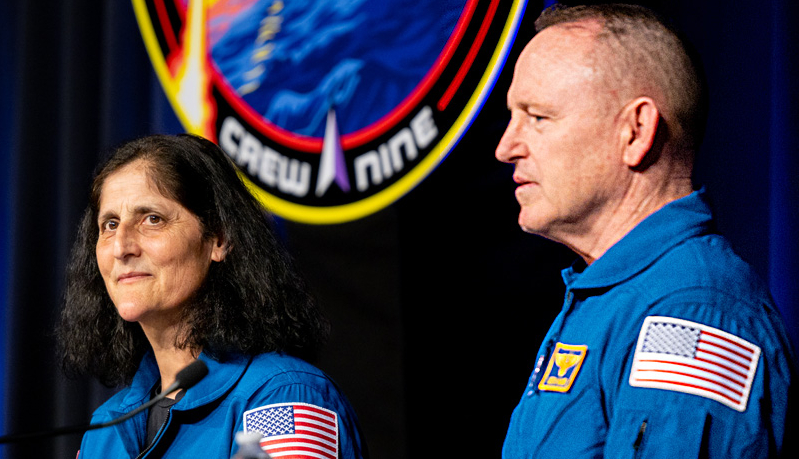
Last month, Suni Williams and Butch Wilmore returned to earth after their eight-day mission aboard the International Space Station (ISS) was unexpectedly extended to a nine-month stay. For a few days there was quite a bit of commentary noting that the extra time seemed to take its toll on their bodies.
When they splashed down off the coast of Florida in their capsule, both Suni and Butch appeared visible aged. Williams’ flowing chestnut hair had turned almost totally white (perhaps from lack of being able to artificially color it while in space). According to scientists, astronauts experience accelerated ageing—with about 1% of their bone and muscle withering away each month they were in space.
Space is a very extreme environment for the human body.
Floating around in a weightless environment can feel totally awesome. But when it comes to muscle, it’s a case of use it or lose it—and bodies don’t work as hard when there’s no gravity. Your heart becomes weaker because it doesn’t have to pump blood against gravity. You eat less, you don’t get as much sunlight and apparently the increased radiation causes DNA damage akin to smoking a pack of cigarettes a day. In short, space is a very extreme environment for the human body.
Place, space and bodies
I’m quite intrigued by the idea that some of us may make it to space (or Mars!), though our bodies may pay the price. It seems our bodies are perfectly designed for life here on earth, but beyond that, who knows?
Beyond space travel, developed cultures struggle with the importance of bodies. In the ‘yes’ camp are the gym bunnies honing the perfect body. Advertisers also seem to think bodies matter, even if the ideal image is constantly changing.
In the ‘no’ camp are those who neglect their bodies with bad diets, the online gamers with their avatars and the rare few looking to cryogenically freeze their brains on the assumption they can regenerate a new body when their time runs out.
Most views fall somewhere in between. When it comes to being born in the wrong body for example, the trans movement sees bodies as important enough to want to change them but also something that can be changed at will, at least at surface level—though do check out this fascinating BBC piece on how one person changed their mind on transition surgery following an encounter with Jesus.
Bodies and the Being Human lens
We don’t have a body; we are embodied.
To be human is undeniably a physical thing. The conversation around bodies sits in the presence section of the Being Human lens. We don’t have a body; we are embodied. And being a body is something we share with every other human being. It is through our bodies that we are present to each other and in the world.
Our daily rhythms are orientated around our bodies—waking, dressing, eating, drinking, working, walking and so on—all of which look very different in space. Bodies locate us in a particular time, in a particular place, with particular people. Bodies are particular.
We don’t have a body; we are embodied. And being a body is something we share with every other human being.
It is also true that your experience of being embodied is unique to you. Although we all have bodies, yours is different to mine and vice versa. Some are growing, some are frail, some are healing and some are faltering. We have incredible bodily autonomy, but that freedom is mixed with frailty. We use and abuse our bodies in a variety of ways—we train them, tan them, feed them, pierce them, ink them and work them.
Perhaps you have been fasting for lent and restricting what goes into your body. Maybe you are following debates about assisted suicide, which in the UK means possible changes to the law allowing doctors to help end the lives of patients when their bodies fail. Or maybe you’re intrigued by the impact of space on the bodies of those astronauts who got stuck for nine months.
The God story reminds us that bodies matter.
The God story reminds us that bodies matter, and communion is a great practice to reflect on the body—an embodied experience around a moment of transformation: “Take and eat; this is my body.”
We share in the brokenness and the healing. As we approach Easter Sunday, the hope of resurrection does not abolish suffering or the agony of dying—traveling through the valley of the shadow of death is still hard. But death does not defeat us. Instead we await our resurrection bodies in the new heavens and the new earth.
Space may take its toll on our bodies if any of us manage to get there, but Christians do have the certain hope of resurrected bodies that will be incorruptible (1 Corinthians 15:52).
Originally published by the Being Human blog associated with the UK Evangelical Alliance. Republished with permission.
Peter Lynas oversees the advocacy team and the work of the Alliance across the four UK nations. He is passionate about faith in the public square and leads the Being Human project with Jo Frost. He previously worked as a barrister in Belfast before studying theology at Regent College in Vancouver, where he serves on the board. Peter is a regular media commentator, is married to Rose, has two daughters, and loves running.





